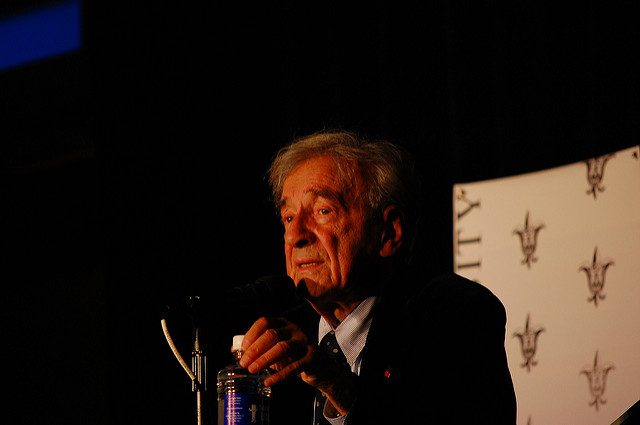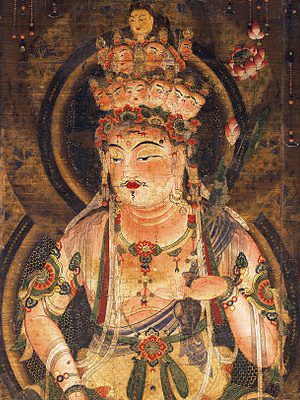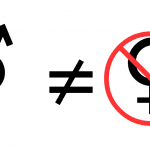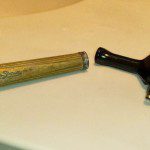This excellent advice (originally offered after the death of the execrable Antonin Scalia) has been re-tweeted recently:
It seems necessary to apply this to Elie Wiesel, who is currently being hagiographized in the mainstream press. For example, from the New York Times:
No single figure was able to combine Mr. Wiesel’s moral urgency with his magnetism, which emanated from his deeply lined face and eyes as unrelievable melancholy.
“He has the look of Lazarus about him,” the Roman Catholic writer François Mauriac wrote of Mr. Wiesel, a friend.
President Obama, who visited the site of the Buchenwald concentration camp with Mr. Wiesel in 2009, called him a “living memorial.”
“He raised his voice, not just against anti-Semitism, but against hatred, bigotry and intolerance in all its forms,” the president said in a statement on Saturday. “He implored each of us, as nations and as human beings, to do the same, to see ourselves in each other and to make real that pledge of ‘never again.’”[Berger]

Now it’s long struck me that people may respond to suffering with the motto “never again!” but may mean it in two very different ways. Some mean “That shall never happen to us again,” where “us” can range from one single human to a whole nation or a supra-national identity such as “Europe” or “Western Civilization”. Others dedicate themselves to the proposition “That shall never happen to anyone again,” that no other human beings shall again have to undergo that sort of suffering. (Or, for a truly universal approach, “no sentient being shall ever suffer like that again” — see the amazing story of Edgar Kupfer-Koberwitz, who deepened his practice of vegetarianism while imprisoned in Dachau.[Univ. Chicago Lib.; Kupfer-Koberwitz])
If one reads the praise of Elie Wiesel currently circulating in the mainstream American press, one might think that Wiesel took that second, universalist lesson from the immense suffering of the Holocaust. After all, he spoke up not just for Jews but for those suffering and killed in Biafra, for Vietnamese boat people, for poltical prisoners in Latin America, for the people of Tibet, for those oppressed by racism in the American South and in South Africa, for victims of ethnic cleansing in Bosnia and Kosovo and Cambodia and Rwanda and Darfur.[Chmiel; Berger]
But in the narrative of the American press, the Palestinian people do not exist. And so a telling gap in Wiesel’s advocacy is being skipped in the rush to praise him.
The Palestinians were not the only gap in Wiesel’s concern for human rights and human suffering. As President of the US Holocaust Memorial Council he opposed including Roma (gypsy) victims in the Holocaust Memorial Museum.[Observer] He maintained that Jews were the first victims of the Nazis and that the Holocaust was an “essentially Jewish event” with “the Jewish people…alone…destined to be totally annihilated”, denying that the Nazis took anti-Roma actions (some building on existing Weimar Republic laws) with the goal of utter annihilation even before they started their genocide of the Jews.[Hancock]
While there is no doubt that European Jews were by far the group most affected, ignoring the way in which the Holocaust targeted other ethnic groups, homosexuals, and various political ideologies and framing it as exclusively Jewish event is problematic. It has been a useful appeal to pity for apologists for Israel’s crimes against the Palestinian people. But it’s historically inaccurate, and the argument that “Millions of Jews were horribly murdered in the Holocaust, therefore the Jewish state is exempt from criticism” is perhaps the ultimate victim culture non sequitur.
More dangerously this argument understates the threat that Nazism posed to the world. It hides the fact that fascists and other violent authoritarians will not stop with eliminating just one group of “undesirables”, which is one more reason why we must stand in solidarity to assure freedom and security for all.
Wiesel said, “I am obsessed with silence because of the silence of the world. Where were the humanists, the leaders, the liberals, the spokesmen for mankind? The victims needed them. If they had spoken up, the slaughterer would not have succeeded in his task.” Yet he remained silent about Jewish terrorist violence against the British and Arab population in pre-Israel Palestine. He did not speak against the massacres of Palestinians by Israeli forces at Kafr Qasim and Qibya, or against the slaughter of Palestinians refugees at of Sabra and Shatila by Israeli-backed Lebanese Christian militias, or against decades of repression in the occupied territories. He occasionally expressed sympathy for Palestinian suffering but refused to examine its historical roots it or allocate any blame to Israel, Zionism, or British and American imperialism, laying blame only on Arab nations and the Palestinians themselves.[Chmiel]
After Israel’s invasion of Lebanon he used a remarkable excuse for his silence: “I am not Israeli, I am a Diaspora Jew, and the price I pay, the price I chose to pay for not living in Israel, especially in times of danger, is not to criticize Israel from outside its borders.” Later, after the First Intifada, he said “In personal terms: I refuse to see myself in the role of judge over Israel. The role of the Jew is to bear witness; not to pass judgment.”[Chmiel]
That’s an amazing bit of special pleading for Israel for one who spoke out in judgment against acts of oppression committed by many other nations. It’s a huge and disappointing blind spot. No wonder writer and editor Adam Shatz once called him “a specialist in denial.”[Shatz]
Still, had Wiesel merely been hypocritically silent about Israel’s crimes, we might still see him as a hero with feet of clay, a fundamentally heroic yet ultimately human figure who was never able to overcome some understandable biases in order to see his own tribe clearly but still did good.
Unfortunately his errors go deeper. Wiesel didn’t just remain a silent denialist of Israel’s crimes, he actively criticized those who spoke about against them. He called the Goldstone report on the Gaza conflict a “a crime against the Jewish people”[Shamir] for daring to be critical of Israel — a heck of a charge to make against the Jewish Goldstone. (This was part of a campaign to pressure Goldstone into walking back some findings of that report, a campaign so brutal it included South African Jewish leaders attempting to keep him from attending his grandson’s bar mitzvah.[Braude])
Wiesel took a half-million dollars from the homophobic preacher John Hagee, for a single speech to Hagee’s congregation.[Blumenthal] Hagee believes that Hurricane Katrina was God’s punishment for the United States and that Hitler was part of God’s plan to get Jews back to Israel — a necessary precondition for the Second Coming, he and other “Christian Zionists” believe.[Koppelman] Wiesel was willing to cozy up to this vile character — a nutcase so far out that even John McCain, the guy who chose Sarah Palin for a running mate, had to disown him — so long as Hagee supported Israel’s policies.
But most fatally to the picture of Wiesel as an agent of justice, he actively supported crimes against the Palestinian people. He served as chairman of the public council of Elad,[Sheiza] an organization dedicated to the ethnic cleansing of Palestinians from East Jerusalem.[IMEU, Nebehay] He publicly congratulated and praised Jewish settlers who illegally invaded and occupied the Palestinian neighborhood East Jerusalem neighborhood of Silwan.[Sheiza]
Wiesel may have helped draw the world’s attention to the horrors of the Holocaust. But he did not learn nor practice the lesson of “never again.” Instead he used his reputation to lend credibility to other crimes of ethnic oppression. He fell into the trap of setting one set of rules for groups and nations he thought of as “other”, and a different set for the groups with which he identified — exemplifying the cliche “Do as I say, not as I do.”
It is a sad lesson that suffering does not necessarily instill virtue. We want horrible suffering to have some meaning, to justify itself in some way by transforming the sufferer into a better person. But sometimes all it teaches is a certain meanness, pushing those who have suffered to limit the circle of their compassion out of fear.

And so even as we criticize Wiesel we should not lose compassion for his suffering, for the immense suffering of all who experienced the Holocaust. The bodhisattva Kannon (a.k.a Kuan Yin, a.k.a. Avalokiteśvara) is sometimes portrayed with eleven heads, so as to have twenty-two ears and hear all the cries of suffering from the world. We must have the ears to hear both the cries of Holocaust suffering and also that of the Nakba and the occupation.
Berger, Joseph. “Elie Wiesel, Auschwitz Survivor and Nobel Peace Prize Winner, Dies at 87.” New York Times, 2 Jul 2016, A1. http://www.nytimes.com/2016/07/03/world/europe/elie-wiesel-auschwitz-survivor-and-nobel-peace-prize-winner-dies-at-87.html
Blumenthal, Max. “CUFI: Elie Wiesel Took $500K From Hagee For One Speech” Feb 2010. http://maxblumenthal.com/2010/02/cufi-elie-wiesel-took-500k-from-hagee-for-one-speech/
Braude, Claudia, Gal Beckerman, and Larry Cohler-Esses. “Did a Private Meeting Prompt Goldstone To Change His Mind?” The Forward 6 Apr 2011. http://forward.com/news/136818/did-a-private-meeting-prompt-goldstone-to-change-h/
Chmiel, Mark. “Elie Wiesel and the Question of Palestine.” Tikkun Nov-Dec 2002. https://holditall.wordpress.com/2014/04/02/elie-wiesel-and-the-question-of-palestine/
Hancock, Ian. “Gypsies in Nazi Germany.” Land of Pain: Five Centuries Of Gypsy Slavery Chapter IX. 1985.
http://chgs.umn.edu/histories/victims/romaSinti/gypsies3.html
IMEU. “Elad, the Jewish National Fund & the US Taxpayer-Subsidized “Judaization” of Silwan” 8 Oct 2014.
http://imeu.org/article/elad-the-jewish-national-fund-the-us-taxpayer-subsidized-judaization-of-sil
Koppelman, Alex. “McCain rejects John Hagee endorsement”. Salon. 22 May 2008. http://www.salon.com/2008/05/22/mccain_hagee_2/
Kupfer-Koberwitz, Edgar. “Animals, My Brethren.” http://neveragain.org.il/articles/animals-my-brethren-edgar-kupfer-koberwitz/
Nebehay, Stephanie. “U.N. rights investigator accuses Israel of ‘ethnic cleansing'”. Reuters. 21 Mar 2014.
https://www.yahoo.com/news/u-n-rights-investigator-accuses-israel-ethnic-cleansing-172223577.html?ref=gs
Observer Staff. “Forgiving Elie Wiesel, Somewhat, on His Opposition to Gypsies in Holocaust Museum”. 2 Jan 2007.
http://observer.com/2007/01/forgiving-elie-wiesel-somewhat-on-his-opposition-to-gypsies-in-holocaust-museum/
Shamir, Shlomo. “Nobel Prize Laureates Back Elie Wiesel anti-Ahmadinejad Ad”. Haaretz 02 May 2010.
http://www.haaretz.com/nobel-prize-laureates-back-elie-wiesel-anti-ahmadinejad-ad-1.262817
Shatz, Adam. “Oprah’s new mess.” LA Times, 18 Jan 2006. http://articles.latimes.com/2006/jan/18/opinion/oe-shatz18
Sheizaf, Noam. “Elie Wiesel and Amos Yadlin congratulate East Jerusalem settlers.” +972, 10 Oct 2014. http://972mag.com/elie-wiesel-and-amos-yadlin-congratulate-east-jerusalem-settlers/97540/
University of Chicago Library. “Guide to the Edgar Kupfer-Koberwitz Dachau Diaries 1942-1945.” University of Chicago Library, 2006. http://www.lib.uchicago.edu/e/scrc/findingaids/view.php?eadid=ICU.SPCL.KOBERWITZ
You can keep up with “The Zen Pagan” by subscribing via RSS or e-mail.
I’ll be at the Starwood Festival July 12-18. If things come together maybe I’ll be able to do some vlogging from the festival.
If you do Facebook, you might choose to join a group on “Zen Paganism” I’ve set up there. And don’t forget to “like” Patheos Pagan and/or The Zen Pagan over there, too.

















